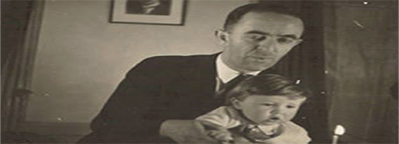Ink In The Blood: Growing Up In The Publishing World

Many book lovers dream of a life in the publishing world - but what’s it like to grow up in it? Michael Gill, chairman of M.H. Gill & Co. Unlimited Company, tells of a life with ink in the blood...
Like many publishing companies until the 1960s, Gill’s has its own printing department. It was situated behind the publishing offices and bookshop on Dublin’s O’Connell St and had been there for at least a century. As a young child I always found a visit to the printing works captivating; the particular smells of ink, oil, paper and glue are still vivid memories. So too are the sounds; the rapid keystrokes and hiss of compressed air from the monotype keyboard; the persistent clacking of the monotype caster with its hundreds of moving parts and pot of molten lead; the studious silence of the composing room where elderly men in white aprons made up pages of corrected type on the ‘stone’ (one of them was reputed to be fluent in Latin, classical Greek and Hebrew); the thunder of the printing presses; the terrifying glide of the guillotine as it sliced its way through reams of printed paper preparing it for the sewing and binding processes.
It was a strictly segregated work place – men only as compositors, pressmen and binders. Women worked exclusively in the sewing room and even occupied their own floor in the building. It came as a surprise when working with a publishing company in France in the early sixties to enter a composing department staffed almost entirely by women. (I mentioned this to one of our compositors on returning to Dublin and was greeted with a comment that reflected poorly on the reputation of both women and the entire French nation)!
There were also formalities; supervisors or ‘foremen’ with always addressed as ‘Mister’. ‘Mister’ Smith ran the binders; one never called him ‘Ned’. ‘Miss’ Black ruled the sewing department although her family would have know her as ‘Mary’. However ‘Cocker’ Byrne operated the monocaster, cigarette permanently in his mouth wearing dungarees so coated in years of oil and spots of lead that they would have disintegrated if washed.
My father often worked at evening and over weekends correcting proofs at home. These were ‘galleys’ or long columns of type before being divided into pages. The process of correction had its own mysterious language of signs and symbols which I was taught from an early age. And the curious language of printing became familiar as well – quoins, reams, bleeds, gutters, carats, picas, ems and ens. So when as a seventeen year old I entered the Monotype School in London to study for the diploma in typesetting, I had a clear advantage over many of my fellow students.
By today’s standards both the publishing and printing departments at Gill’s were seriously inefficient. As the printing department (especially typesetting and composition) was dependent upon publishing for its work, uncorrected and frequently handwritten manuscripts were often sent for typesetting with little if any instruction for design or choice of typeface. This resulted in heavy correction on galley proofs and the issue of a second set of galleys all of which was time-consuming and costly. Authors were also given generous latitude to write and re-write their work even through the page proof stage.
It was only when I went to work in New York that I encountered for the first time the practice of pre-preparation of scripts which were carefully copy-edited and marked up for the typesetters, specifying font and type size. It was even common to count manually the word extent of scripts so that an estimate could be made of the final extent of the printed book. But that was at a publishing company whose printers were hundreds of miles away in Pennsylvania and not the other side of a wall, or at the end of a staircase, in O’Connell Street, Dublin.
The printing department of Gill’s closed in 1966. Every member of staff was offered employment with other printers in Dublin; some of the compositors had multiple job offers. And two years later Gill & Macmillan was founded.
We're Hiring - Gill Books Publicist
© 2025 M.H. Gill & Co. Unlimited Company